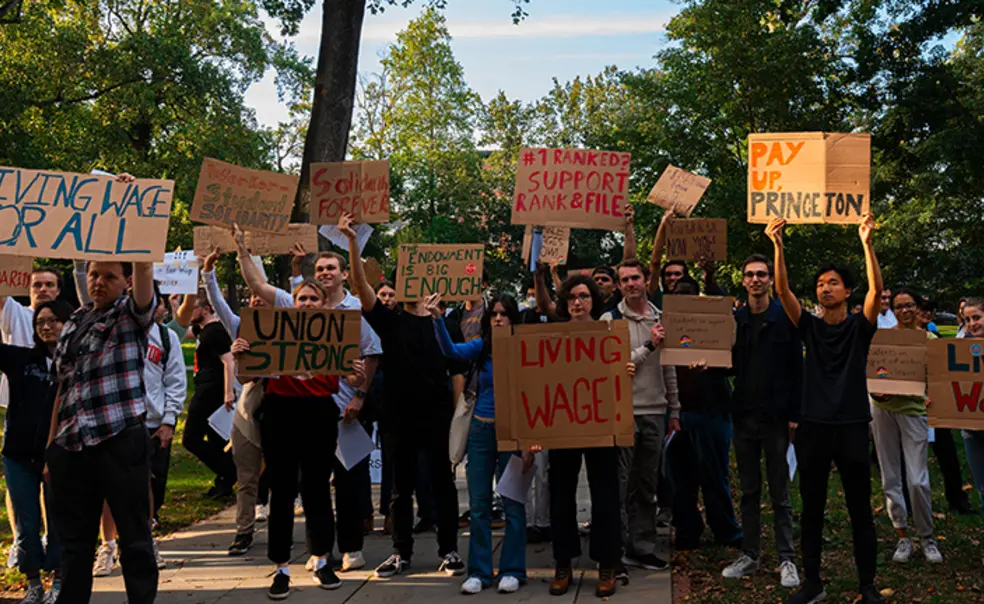Students, Staff Call on Princeton to ‘Pay Up’ for Unionized Workers
‘Princeton needs to wake up and realize that we are the market,’ said union leader Jeffrey Coley
A crowd of about 80 student activists, professors, and staff gathered in front of Nassau Hall Sept. 21 to call attention to the struggles of unionized workers. Large signs reading “Pay Up Princeton” and “Union Strong” moved with the crowd as speakers demanded higher wages for workers and students signed petitions in solidarity.
The Workers’ Town Hall was organized by Princeton’s student-run Young Democratic Socialists of America (YDSA) chapter and included speeches by history professor Matthew Karp, graduate student activist Mauro Windholz, and Jeffrey Coley, the president of the Service Employees International Union (SEIU) Local 175. Members of the YDSA also read aloud worker testimonies, which were submitted anonymously before the event. Each address was punctuated by chants celebrating the presence of unions on campus and demanding change.
“This university’s endowment has grown by leaps and bounds, but our wages have grown by spurts and sputters,” said custodian Tom Mahoney, who has worked in Building Services for over 13 years. “We work long and hard hours. Early and late hours. We love our jobs, but we do not feel love in return.”
The anonymous worker testimonies stressed the mounting financial pressures of a post-pandemic world and shared stories about having to work multiple jobs just to make ends meet as prices keep climbing.
Lake Liao ’27, a YDSA member, read from the testimonies: “My salary is not enough for a single father with two kids. I literally have to choose if I’m going to have breakfast or lunch most days because the price of food is so high. The small 2% or 3% raises we get are always erased by the annual 3% raise we pay for health insurance.”
Coley underscored the University’s responsibility to take care of its employees, saying he felt responsible for unionized workers.
“I am tired of hearing ‘the market analysis says this, or that.’ Princeton needs to wake up and realize that we are the market. We need better than a living wage. That’s the bottom line,” Coley said.
When Coley spoke with PAW, he described worker treatment as a systemic, statewide problem that originates beyond Princeton’s gates. He detailed how New Jersey’s Temporary Workers Bill of Rights (TWBR) set the hourly wage of temporary workers to the sum of the average hourly wage of permanent employees of the institution and “fringe benefits,” such as health insurance. For Coley, this puts Princeton’s permanent workers at a severe disadvantage.
“Temporary workers can get up to $6 more per hour than a permanent employee. Princeton must realize that temp agencies need to go. It’s not right,” he said.
In the silences between speeches, students and workers united their voices in rallying cries.
“When workers are under attack, what do we do? Stand up and fight back!” the crowd chanted, making its message heard across the green.
Campus workers who spoke with PAW said they found the crowd’s energy electrifying and voiced gratitude for student support.
“It means so much to see all of you supporting us. We work for you, the students, and we are honored that you feel this way towards us. We are stronger together, as one,” said Erik Breza, who works in Building Services and is on the executive board of SEIU Local 175.
Coley announced that in October that some Princeton workers will begin renegotiating their contracts with the hope of making their demands heard. This occurs amid a revival of attention paid to union and labor power across the nation. According to the Bureau of Labor Statistics, the number of union workers in the private sector increased by 193,000 in 2022, though the private-sector unionization rate continued its gradual decline, from 6.1% in 2021 to 6.0% in 2022, a record low.
In a statement to PAW, University spokesman Michael Hotchkiss said, “Princeton deeply values its SEIU employees and their important contributions to the pursuit of the University’s mission. We also appreciate our productive working relationship with the SEIU union and we look forward to maintaining that through the coming contract negotiations.”
“I feel privileged to work here, and even more privileged to have a union behind me — to not have to shrivel in a corner and pretend that nothing is bothering me,” said Debbie Sidoran, a union worker in Building Services. “We live in strange times, and we need union strength more than ever.”










No responses yet